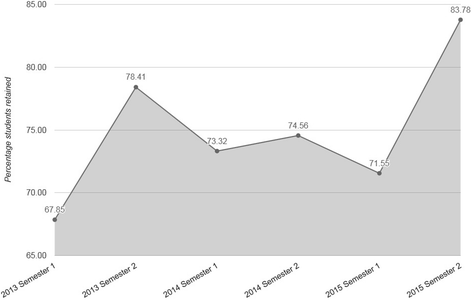Part
01
of one
Part
01
Student Engagement and Retention
Generally, an increase in student engagement increases student retention and vice versa. Data, information, and statistics to support this link between engagement and retention can be found below.
Definitions of Student Engagement and Student Retention
- Student engagement is described as the amount of effort and time that students place in their involvement in educational practices that are beneficial for promoting their learning and development. It also refers to the intentional efforts that institutions put into promoting and investing in these activities to impact student success and academic attainment.
- Student retention is measured through the return rates from one year to another among students. It can also be considered as student persistence or progress. If retention is successful, it ends in graduation.
Community College Survey of Student Engagement
- In the case of the Community College Survey of Student Engagement (CCSE) which was the basis for this study, the five engagement benchmarks were student efforts, active and collaborative learning, support for learners, academic challenge, and student-faculty interaction. Altogether, studies using CCSE reveal that student engagement in educational practices that are effective has a positive effect on retention.
- A multi-year study for students enrolled in the Florida Community College System found that active and collaborative learning, in particular, had a small effect on student retention. It also significantly caused "persistence to the following term and the second year." Student engagement accounted for over 30% of retention rates after controlling for background variables.
Technology for Student Engagement
- This study analyzed the use of a gamified mobile application to introduce engagement and the consequent student retention. The app was intended to engage students in lecture content by delivering multiple-choice quizzes directly to their phones before and after lectures.
- The app's introduction in semester 2 in 2015 led to a 12.23% increase in student retention compared to the pre-app cohorts.
- A similar pattern of improvement was found when compared to the two previous years (9.22% and 5.37% respectively).
- Students who used the app had a higher average grade of 65.19% in comparison to those who did not use the app. The app's users averagely scored 7.03% higher compared to those that did not use it, increasing their retention rates.
- Colorado State University went in the same direction by integrating data to engage students. They leveraged opportunities to support and improve communication with students, engaging them at a personal level in academic planning. The result was an increase in retention rates from 82% to 86% and graduation rates from 62% to 66%.
Early Engagement
- To address online student-engagement issues, Richland Community College in Illinois developed an initiative whereby online students needed to take mandatory engagement activities alongside their main courses. The outcome was an increased retention rate, "from 71.8% to 79.5%" within a year.
- The University of Hull in England introduced an early engagement method through "Welcome Lunch" which engaged the students socially as they found out more about the university before officially registering. Welcome Lunch attendees who eventually registered and began studying had a higher likelihood of continuing compared to the general student population. 93% continued beyond their first year.
Other Engagement Methods
- The Study Skills Summer School at The University of Hull helped students (new and continuing part-time) feel that they were part of their cohort and realize that they were not alone in their course experiences. Retention rates for those who attended the Summer School were higher than those who did not. Over three years, 4% and 6% of new Summer School attended who registered and began studying did not withdraw from the university.
- The School of Mechanical and Systems Engineering (MSE) of Newcastle University introduced a cohort system that encouraged students to work in teams. In 2009-2010, 94% of students remained on the same program the following year, which was the highest number of students who remained in the same program in the subsequent year for the five years whose academic data was available, and 9.3% higher than the previous year.
- This study aimed to investigate the relationships between the academic engagement of first-year students and early dropout intentions measured in the first semester of university. Regression analysis showed that students with "strong engagement in their studies, who experience pride, inspiration, and enthusiasm in school, are less likely to drop out in the first semester of university."
Statistics on a Reduction in Engagement
- Two projects revealed that the presence of academic support for engagement to develop confidence and skills facilitates student retention.
- 43% of students that left one of the projects felt that not being given "helpful academic support" by their department influenced their decision to leave by a weight of 16%.
- 25% attributed the fact that they did not know ‘where to go to seek academic help or advice’ influenced their decision by 6%.
- At least 1 in 7 students seek academic or personal assistance from their department and do not receive it, contributing to early withdrawal.
Research Strategy
We were not provided a geographic focus for this project, so we assumed a broad approach and looked globally. We did not find sources with numerical data that could provide the requested information in form of 'increasing engagement by X results in Y or decreasing engagement by X results in Y.' This is probably because engagement is hard to quantify. We did find clear data linking engagement to retention and provided actions or initiatives that have been taken or that are in existence that increase or reduce student engagement and in turn affect retention (persistence, continuation, and graduation) in higher education.
